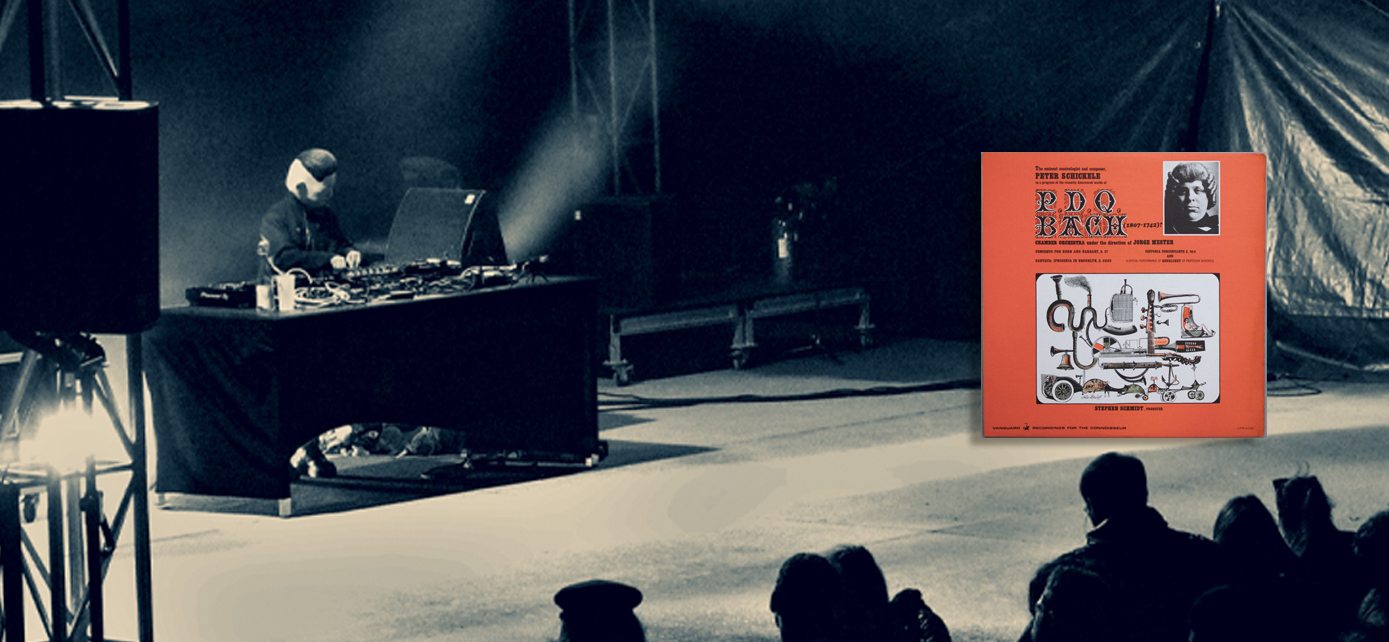
Permanent Rotation: DJ Bus Replacement Service
Permanent Rotation is a series in which producers, DJs, and musicians go deep on the albums that have inspired them.There’s no DJ quite like Doris Woo, better known as DJ Bus Replacement Service. Famed for performing almost exclusively in a Kim Jong Un mask, Woo takes irreverence to delightful new frontiers in her oddball DJ sets, in which you might hear everything from Russian donk to obscure Eurovision anthems, hard techno and Cantonese hip-hop. I’m always curious to hear which album participating artists select for this column and knew that Woo in particular would not disappoint. Peter Schickele Presents An Evening with P. D. Q. Bach (1807–1742)? is a classical music parody written and performed live by the late American composer Peter Schickele in 1965. Schickele invented the titular character and fictional composer, the "youngest and the oddest of the twenty-odd children" of Johann Sebastian Bach, and released and performed a significant body of work as this wacky alter ego, featuring imaginative instruments such as the left-handed sewer flute, the dill piccolo (for playing sour notes), and the "tromboon" ("a cross between a trombone and a bassoon, having all the disadvantages of both"). Fun fact: Jurassic 5's “Monkey Bars” contains a sample of “P.D.Q. Bach's 'Concerto for Horn and Hardart, S.27”. “It’s so fucking sick,” enthuses Woo. “It's the only thing I know that has sampled P.D.Q Bach, but they did it brilliantly.”“I first discovered this album when I was in elementary school in Indianapolis, via my fourth and fifth-grade music teacher,” says Woo on a video call from her home in the UK midlands, where she apologises for her dishevelment post-pickleball practice (Woo has only recently returned to DJing, having taken most of 2024 off to focus on her flourishing pickleball career).“He didn’t mince any words, he would insult us,” Woo recalls of her cranky teacher. “But at the same time, he was introducing us to stuff…the first time I heard this album it absolutely blew my mind.”
The combination of classical music and humour was catnip to a young Woo, who was later reintroduced to Schickele at university where her appreciation for him as a musicologist deepened in tandem with her own musical knowledge. “What I love about it is that it's so musically coherent — everything about those compositions is correct, and because it's correct, he can then add stuff on top of it to fuck things up and be subversive where you don't expect classical music to be subversive,” she says. The album “goes to the heart of the DJ BRS musical DNA”, Woo notes, having directly or indirectly inspired her rabble-rousing take on DJing as well as her passion for off-the-wall music. Woo fell in love with comedy as a kid, a few years before becoming a music-obsessed teen, and she shares with Schickele a frustration with the stylistic pigeon-holing that befalls musicians, especially those whose work incorporates humour. “It’s always bothered me that people accept the idea of a novel or a play or a movie that is basically serious having comic scenes in it, but in music, they seem to say, this is either a serious piece or a funny piece [and there’s] nothing in between,” Schickele said in a 1996 interview. Like DJ BRS sets, his recorded works as P.D.Q Bach require listening with an open mind and receptivity to the absurd. When Woo began dating techno artist Surgeon (Anthony Child) in 1998, they exchanged mixtapes, as new lovers tended to do in the cassette era. “I made Tony a mixtape of P.D.Q. Bach and he'll still say to this day that he was a little bit concerned,” says Woo. “He was sending me [Coil’s] Horse Rotorvator and Love’s Secret Domain and I’m sending him music that people are laughing at. What sophisticated people hate is hearing a laugh track and going, oh, I’m supposed to find that funny.”In Woo’s defence, a lot of the visual gags are missing from the recording of An Evening with P. D. Q. Bach, including the nonsense instruments that Schickele invented. “Lots of stuff that people are laughing at wasn't necessarily for the ears, it was also for the eyes,” Woo says. “I'm pretty sure that few people had seen the kind of turning classical music on its head as Schickele did.” (She adds that American bandleader Spike Jones, who also parodied classical music and popular song arrangements, was a notable predecessor, as well as the Danish-American pianist Victor Borge).
180.Fact · FACT Mix 755: DJ Bus Replacement Service (Apr '20)
The satirical nature of Schickele’s work as P.D.Q. Bach often obscured the serious musicality behind it. After all, Schickele did graduate from Juilliard with a master’s in music composition. “You have to be a really high-level music musician to be able to get away with knowing when you can subvert and when you need to retain the musical structure of something so that it's still plausible,” says Woo. It’s a delicate balancing act echoed in DJ BRS sets as Woo aims to disarm audiences without completely clearing the dance floor, although this is always an inherent risk for such an audacious selector.She recalls a gig with Surgeon in Munich a few years back where her handover track was an excerpt from a BBC Radio 4 soap opera called The Archers, in which one of the main characters gives a new character (her future boyfriend) a massage. “I played this four-minute clip which seemed like it went on for a thousand years,” says Woo. Surgeon stood by “dying on the inside” as he waited for his turn on the decks. “That’s when he decided we were no longer going to be doing back-to-back with each other,” laughs Woo. “He didn’t want to get caught out like that again.”








